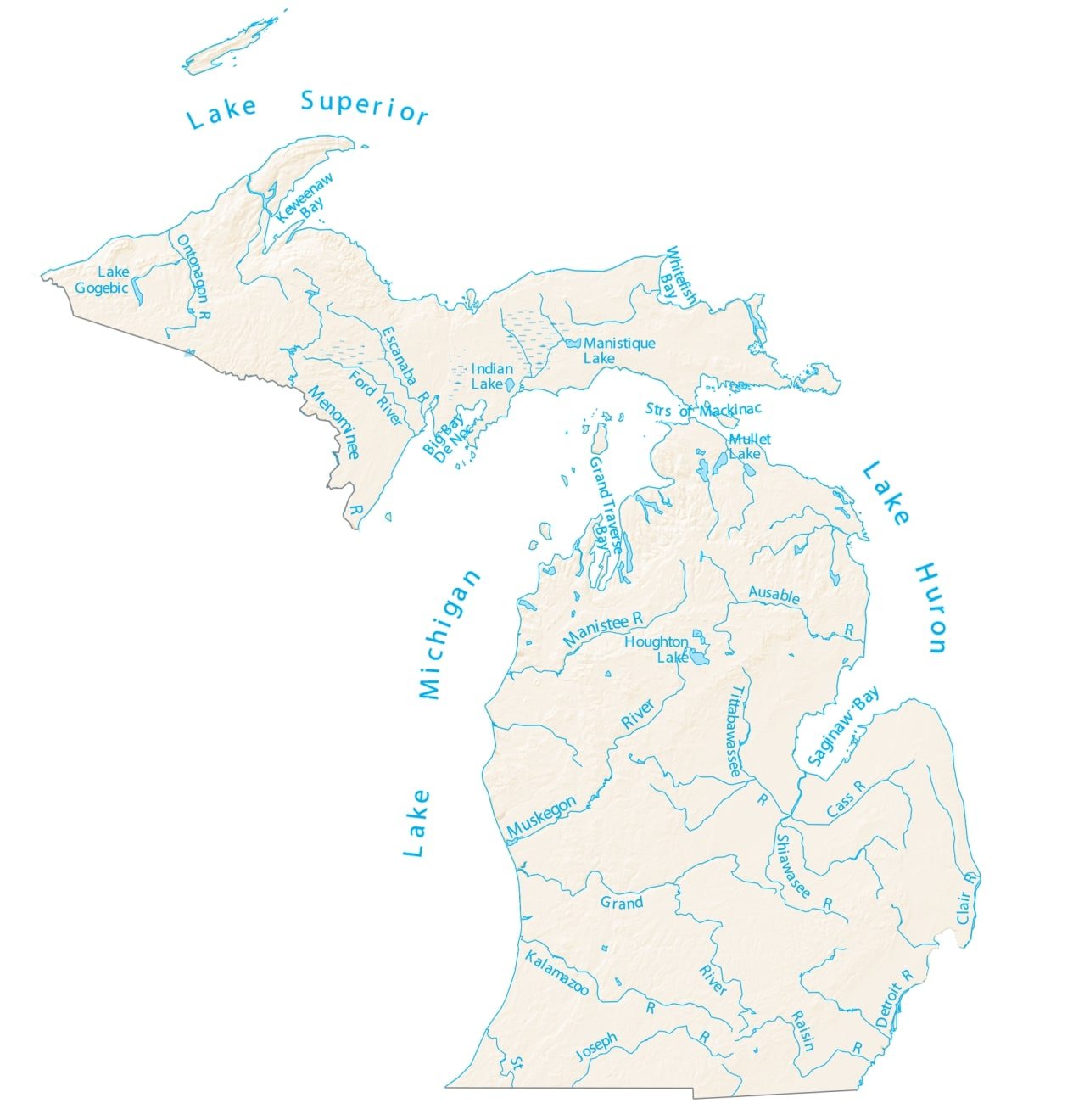Michigan, located in the Midwestern region of the United States, is a state known for its beautiful natural scenery, including its numerous rivers and lakes. The Michigan rivers map is surrounded by four of the five Great Lakes, making it the perfect place for water sports, fishing, and boating. It is also home to a vast network of rivers that play an important role in the state’s economy, providing irrigation, hydroelectric power, and transportation. In this essay, we will take a closer look at the Michigan rivers map and provide detailed information about each of the major rivers in the state.
Michigan Rivers Map

The Grand River is the longest river in the Michigan rivers map, stretching over 250 miles from its headwaters in Jackson County to its mouth in Lake Michigan. It is known for its excellent fishing, including steelhead and salmon, and is popular among kayakers and canoeists. The Grand River is also an important source of hydroelectric power, with several dams along its length generating electricity for the state.
The Muskegon River is another major river in the Michigan rivers map, flowing over 150 miles from its headwaters in Crawford County to its mouth in Muskegon Lake. It is known for its scenic beauty and is popular among fishermen, who come to catch species such as steelhead, salmon, and brown trout. The river is also home to several important hydroelectric dams, providing energy for the state.
The Flint River is a shorter river, stretching over 100 miles from its headwaters in Lapeer County to its mouth in Flint. It is known for its excellent fishing opportunities and its role in the state’s industrial history. The Flint River was once an important source of water power for the state’s early industries, and several historic sites along its banks still exist today.
The St. Joseph River is another important river in the Michigan rivers map, stretching over 150 miles from its headwaters in Hillsdale County to its mouth in Lake Michigan. It is known for its scenic beauty and its role in the state’s agricultural economy, providing irrigation water to local farms. The St. Joseph River is also a popular spot for fishing, with species such as steelhead and salmon found in its waters.
The Manistee River is another river of significant length, stretching over 100 miles from its headwaters in Crawford County to its mouth in Manistee Lake. It is known for its scenic beauty and is popular among kayakers and canoeists, who come to enjoy its rapids and waterfalls. The Manistee River is also home to several important hydroelectric dams, providing energy for the state.
The Pere Marquette River is a shorter river, stretching over 50 miles from its headwaters in Lake County to its mouth in Lake Michigan. It is known for its scenic beauty and its role in the state’s industrial history, with several historic sites along its banks still in existence today. The Pere Marquette River is also popular among fishermen, who come to catch species such as steelhead, salmon, and brown trout.
The Au Sable River is another important river in Michigan, stretching over 120 miles from its headwaters in Oscoda County to its mouth in Lake Huron. It is known for its scenic beauty and is popular among kayakers and canoeists, who come to enjoy its rapids and waterfalls. The Au Sable River is also home to several important hydroelectric dams, providing energy for the state.
In conclusion, Michigan is home to a vast network of rivers, each with its own unique history and character. From the Grand River, the longest river in the state, to the Au Sable River, known for its scenic beauty and rapids, these waterways play a vital role in the state’s economy, providing irrigation, hydroelectric power, and recreation opportunities. These rivers are a significant part of Michigan’s heritage, and their protection and preservation are crucial to the state’s future. The Michigan rivers map is an important tool for understanding the state’s waterways, and by exploring it, we can gain a deeper appreciation for the beauty and importance of these natural resources.

